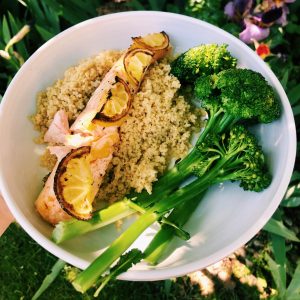Fuel Your Body
In this next part of our series of wellbeing hacks, dietitian Jess discusses ways to fuel your body, to increase your energy levels and feel good, both physically and mentally.
1. Stay hydrated

You have probably heard this hack time and time again but staying hydrated is so important. Every cell of your body needs water to function properly e.g., to transport nutrients and waste, to lubricate your joints, and regulate body temperature. Hydration is essential for overall good health.
Good hydration can also reduce fatigue. If you are feeling hungry, drink a big glass of water before eating, as it is common to confuse thirst with hunger. Also remember, that by the time you are thirsty, you are already slightly dehydrated, so try your best to drink plenty of fluid throughout the day. If you’re not keen on plain water, add a slice of lemon or lime, or even some chia seeds (if you are brave enough!) for added fibre and texture. Check out these fruity infused water recipes for some inspiration.
2. Eat a healthy balanced diet
The World Health Organisation highlighted that a healthy diet can protect the human body against certain types of disease, in particular, non-communicable diseases such as cardiovascular, obesity and diabetes. A healthy diet can also contribute to an adequate body weight and good overall health, as healthy eating meets the nutritional needs of our bodies. A well-balanced diet provides all the energy you need to keep active throughout the day, as well as nutrients needed for growth and repair to help you stay strong and healthy.
This diet should contain a variety and balance of foods. NHS guidelines recommends we follow the the Eatwell Guide to have a healthy and balanced diet. The key points are:
- eat at least 5 portions of fruit and vegetables every day
- base meals on high fibre starchy foods such as potatoes, bread or rice
- have some dairy or dairy alternatives
- eat some beans, pulses, fish, eggs, meat or other protein
- choose unsaturated oils and spreads, and eat them in small amounts
- drink plenty of fluids; aiming for 8 glasses per day
Find out about the fascinating ‘food mood’ connection: how and what we eat can affect how we feel; and how we feel influences what we choose to eat or drink.
3. Do not skip breakfast
Food provides your body with the fuel it needs to function effectively, and it simply isn’t healthy to deny your body food from dinner until lunchtime the next day. Eating in the morning helps to boost energy and improve your mood, making you feel less restless and irritable.
If you are really not hungry in the morning, then ask yourself why. Many people who don’t eat breakfast tend to eat large, more filling meals during the evening hours, which explains why they aren’t hungry when it comes to breakfast time. Research suggests it is best to leave at least 2-3 hours from your last big meal before going to bed, to allow time for the food to digest properly. This will not only improve your appetite and digestion the following day, but you may find you sleep better too.
4. Understand cravings by listening to your body
We all crave sugar once in a while, but that doesn’t mean we actually need sugar. When you feel that sugar craving, don’t overlook it, instead ask yourself:
- Am I stressed? The stress hormone cortisol is elevated during times of prolonged stress and constantly feeling stressed causes our bodies to crave more sugary foods.
- Did I get enough sleep last night? Lack of sleep also causes cortisol levels to rise, and leads to those sugar cravings.
- Am I actually hungry? Sometimes we associate certain foods with different activities or habits, so we end up craving those foods even when we are not hungry. For example, if it’s typical for you to eat ice cream in front of the TV in the evening, you might find yourself craving ice cream out of habit, not real desire.
So, if you find your sugar cravings stem from one of these three factors, there will be a way to take control of the cravings to make sure they are not controlling you. Try to eat nutrient-rich meals (such as grilled salmon and herby couscous), which will leave you feeling full and satisfied. Keeping yourself hydrated may help to curb the cravings too.

In saying all this, there is a balance to strive for here, as you shouldn’t deprive yourself of sugary treats. Ask yourself those three questions, and if they have all been addressed, then enjoy that sweet treat slowly. By enjoying it slowly, your body will realise that it is eating something so you are likely to eat less (aiming for a healthy balance) and you’ll feel satisfied that you have created a nice moment for yourself. This should teach you how to avoid the vicious restrictive cycle of saying no to treats, and then eating every sweet thing in sight and feeling guilty afterwards. It is unrealistic and unhealthy to not indulge, but you want to avoid overdoing it. By understanding cravings, and having indulgences in moderation, you will form a very manageable and healthy relationship with food.
5. Consider taking a daily probiotic
Probiotics are live microorganisms that can be consumed through fermented foods or supplements, and many studies have shown that the balance or imbalance of bacteria in your digestive system is linked to overall health and disease. Probiotics promote a healthy balance of bacteria in the gut, and have been linked to many health benefits such as digestive health and immune function. These can be purchased at Holland and Barrett, or other health food shops, but be cautious when purchasing online as products are sometimes not as healthful as claimed.
6. Eat more fruit and veg
Whilst this might seem like a childhood chore, evidence shows there are significant health benefits to eating at least 5 portions of a variety of fruit and vegetables per day. (A portion is 80g.)

Fruit and veggies are a good source of vitamins and minerals, which will help you become your healthiest self, alongside being an excellent source of dietary fibre, which helps to maintain a healthy gut. Keeping a balanced diet may help to reduce the risk of chronic illnesses, as well as helping to lower blood cholesterol levels.
A UK survey examined the link examined the link between how much fruit and vegetables people ate on a typical day, and their mental wellbeing. They found people reported feeling happier, more purposeful and less anxious when they ate more fruit and veg!
Find out more:
Food Moods
Why our diet can put us in a good mood (or a bad one!)
Want to improve your mental health? Eat your greens – The Washington Post
How To Fuel Your Body For Better Health and More Energy – Huffington Post
Healthy eating recipes:
Energising Green Smoothie
A clean, green citrus blend to boost energy levels
Prawn Pesto Pasta
The perfect plate to combat the post lunch-time lull
Lemon & Chilli Chicken with Quinoa & Chickpeas
Easy prep dish that’s wholesome & high in protein
More wellbeing hacks:
How to build helpful routine into your life
How to sleep better – 10 tips from an expert
